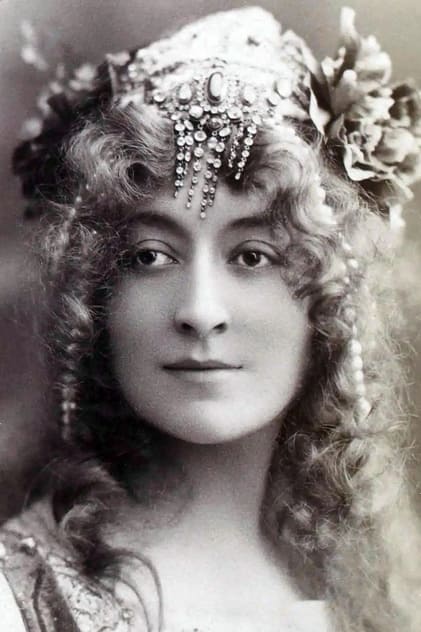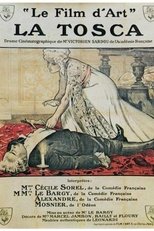

Cécile Sorel
Born: September 7, 1873
Died: September 3, 1966
in Paris, France
Died: September 3, 1966
in Paris, France
Céline Émilie Seurre (7 September 1873 in Paris – 3 September 1966 in Trouville-sur-Mer), known as Cécile Sorel or the Comtesse de Ségur by marriage, was a French comic actress. She enjoyed great popularity and was known for her extravagant costumes.
Sorel was attracted to the theater at an early age, studying with Louis-Arsène Delaunay and Marie Favart. In 1899, she began her career at the Odéon and then, in 1901, became a member of the Comédie-Française, where she specialized in playing a stock character known as the "grande coquette". She was especially well known for her portrayal of Célimène in The Misanthrope. In 1904, she became the 339th "Sociétaire de la Comédie-Française" and remained with the theater until 1933.
Although long engaged to Whitney Warren, an American architect who was related to the Vanderbilts, she eventually married the Comte de Ségur-Lamoignon, great grandson of the famous Comtesse de Ségur, who acted under the name Guillaume de Sax. They were sometimes mocked as "beauty and the beast" and were separated after fifteen years, but she kept the title of "Comtesse" for the rest of her life.
In 1909, she had the starring role in La Tosca, a film by André Calmettes and Charles Le Bargy. Her next film role did not come until 1937, when she played an aged courtesan in The Pearls of the Crown by Sacha Guitry. Four years later, she essentially played herself in a sketch comedy called Les Petits riens, written by and starring Yves Mirande. In 1944, she barely escaped the bombing that destroyed the Théâtre-Français in Rouen.
In 1950, she underwent a "conversion" and, following the lead of the original Comtesse de Ségur, took her vows as a Third-order Franciscan. She adopted the name "Soeur Cécile de l'Enfant-Jésus" and devoted her time to writing. A television documentary of her career was produced in 1965. She died of complications from a fractured hip, suffered in a fall at her rented château on the French coast, and was buried in the Cimetière du Montparnasse.
She was painted by François Flameng and her likeness appears in a fresco by Charles Hoffbauer on the ceiling of the cupola at the Château d'Artigny in Montbazon, once owned by François Coty. A college in the town of Mériel is named after her.
Source: Article "Cécile Sorel" from Wikipedia in English, licensed under CC-BY-SA 3.0.
Sorel was attracted to the theater at an early age, studying with Louis-Arsène Delaunay and Marie Favart. In 1899, she began her career at the Odéon and then, in 1901, became a member of the Comédie-Française, where she specialized in playing a stock character known as the "grande coquette". She was especially well known for her portrayal of Célimène in The Misanthrope. In 1904, she became the 339th "Sociétaire de la Comédie-Française" and remained with the theater until 1933.
Although long engaged to Whitney Warren, an American architect who was related to the Vanderbilts, she eventually married the Comte de Ségur-Lamoignon, great grandson of the famous Comtesse de Ségur, who acted under the name Guillaume de Sax. They were sometimes mocked as "beauty and the beast" and were separated after fifteen years, but she kept the title of "Comtesse" for the rest of her life.
In 1909, she had the starring role in La Tosca, a film by André Calmettes and Charles Le Bargy. Her next film role did not come until 1937, when she played an aged courtesan in The Pearls of the Crown by Sacha Guitry. Four years later, she essentially played herself in a sketch comedy called Les Petits riens, written by and starring Yves Mirande. In 1944, she barely escaped the bombing that destroyed the Théâtre-Français in Rouen.
In 1950, she underwent a "conversion" and, following the lead of the original Comtesse de Ségur, took her vows as a Third-order Franciscan. She adopted the name "Soeur Cécile de l'Enfant-Jésus" and devoted her time to writing. A television documentary of her career was produced in 1965. She died of complications from a fractured hip, suffered in a fall at her rented château on the French coast, and was buried in the Cimetière du Montparnasse.
She was painted by François Flameng and her likeness appears in a fresco by Charles Hoffbauer on the ceiling of the cupola at the Château d'Artigny in Montbazon, once owned by François Coty. A college in the town of Mériel is named after her.
Source: Article "Cécile Sorel" from Wikipedia in English, licensed under CC-BY-SA 3.0.
Movies for Cécile Sorel...

Title: Système 2
Character: Self (archive footage)
Released: January 19, 1975
Type: TV


Title: Paris Nineteen Hundred
Character: Self (archive footage)
Released: February 25, 1948
Type: Movie
Nicole Védrès' chronicle of Paris from 1900 to 1914 is brought to life through the use of original material, all authentic, secured from more then 700 films belonging to public and private collections. A few of the celebrities of the time shown are Enrico Caruso, Sarah Bernhardt, and Maurice Chevalier.


Title: Little Nothings
Character: La Clermont
Released: December 16, 1942
Type: Movie
Following a broadcast on the radio, each of the listeners remembers these "little nothings" (the title is borrowed from a play by Mozart), which have often changed their lives. Each of these stories told will prove that a tiny detail in life can change an entire destiny.


Title: L'An 40
Character: Madame Raffut
Released: January 31, 1941
Type: Movie
Félix Raffut, a Périgord squire terrified by the German invasion, carries out the exodus of his family and his furniture towards supposedly hospitable places.


Title: The Pearls of the Crown
Character: La Française du Grand Siècle
Released: May 12, 1937
Type: Movie
The story of the seven pearls of the English Crown, from Henry VIII to 1937 – three of them missing.


Title: La Tosca
Character: Floria Tosca
Released: March 14, 1909
Type: Movie
Rome, June 1800. Floria Tosca is a celebrated opera singer, better known as La Tosca. Her lover is Mario Cavaradossi, a young artist and Bomapartist sympathizer. When the latter helps Angelotti, the leader of the opposition, to escape from prison and hides him in La Tosca's home, he antagonizes Baron Scarpia, the ruthless chief of police, all the more as his love for Tosca is unrequited. Scarpia has Mario arrested and condemned to death. Upset, Floria begs the Baron for her lover's life. He accepts to have the bullets of the firing squad replaced by blanks if... she sleeps with him. She agrees nominally but when she finds herself with Scarpia, she stabs him to death. She then goes to see Mario in his cell and lets him know about his phony execution. But Scarpia had had time to get the order reversed and in the early hours of the morning, Mario is executed in the proper manner. In despair, Tosca throws herself into the void...
